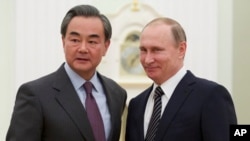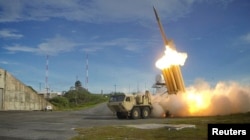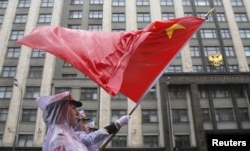Chinese Foreign Minister Wang Yi's two-day visit to Moscow this week has largely focused on North Korea's increasing nuclear threats.
After meeting with Russian counterpart Sergei Lavrov on Friday, Wang said China would not recognize North Korea’s status as a nuclear power. He also said Pyongyang's development of nuclear weapons must be stopped, and that China was firmly committed to denuclearization of the entire Korean Peninsula.
Vowing that Beijing would not abandon efforts to resume six-party talks, Wang said all provisions of the U.N. resolution sanctioning North Korea must be fully implemented, but with an eye to minimizing any adverse impact on ordinary North Koreans.
In the meantime, he said, escalation of tensions on the peninsula should be avoided at all costs.
Opposition to missile system
Both Wang and Lavrov stressed opposition to South Korea's possible deployment of THAAD, the advanced U.S. missile defense system that has been at the center of recent talks between Washington and Seoul. Wang said the system would "undermine security interests of China and Russia, destroy the strategic balance and trigger a regional arms race."
On Monday, Leon Panetta, a former U.S. defense secretary and CIA director, told VOA that ongoing THAAD talks might have pressed Beijing to support the latest U.N. sanctions on North Korea.
Lavrov said Russia and China oppose using North Korea’s nuclear activity as justification for an increased military presence in the region, and that he hoped Pyongyang would heed U.N. Security Council appeals to return to the six-party talks.
Some international relations experts say Beijing and Moscow have been forced to coordinate their positions on Pyongyang because Kim Jong Un refuses to compromise.
"The problem of the Korean Peninsula is extremely important, and it has caused widespread concern among all parties. It is not only a headache for China but also for Russia," said Dmitry Streltsov, a scholar with the Moscow State Institute of International Relations. "Since they don’t see the possibility of any improvement of the situation in the future, it is very important for China to find out about Russia’s bottom line on the issue. The two sides may also discuss any possibilities of taking joint actions."
Russian scholar Alexey Maslov, head of the Oriental Studies Department at the Russian Higher School of Economics Research University, said China is already taking a tougher stance on North Korea by restricting its supply of various material goods. Maslov said Russia should follow suit by reducing its own exports to North Korea.
On same page
Maslov also said he thought Beijing supports Washington's current position on North Korea.
"We should also notice Wang Yi visited the United States recently, and even met with Secretary of State John Kerry," he said. "This shows that on some international issues, especially the North Korean nuclear issue, China and the U.S. share the same position."
Lavrov said after meeting Wang that he expected political interaction between Russia and China "to be no less than last year," and that the quality of economic and trade cooperation between the two countries would improve.
Lavrov also announced that Chinese Premier Li Keqiang has accepted an invitation to visit Russia at the end of this year, and that this fall's G20 summit in China’s Zhejiang province will provide another opportunity for improved Sino-Russian ties.
Russian President Vladimir Putin briefly met with Wang on Friday at the Kremlin, where he told Wang that he hoped to have in-depth discussions with Chinese President Xi Jinping during his visit to China this summer.
Putin also hailed bilateral relations between the two countries and called for more economic cooperation and cultural exchanges.
This report was produced in collaboration with VOA's Mandarin service. Some information for this report was provided by AP.












